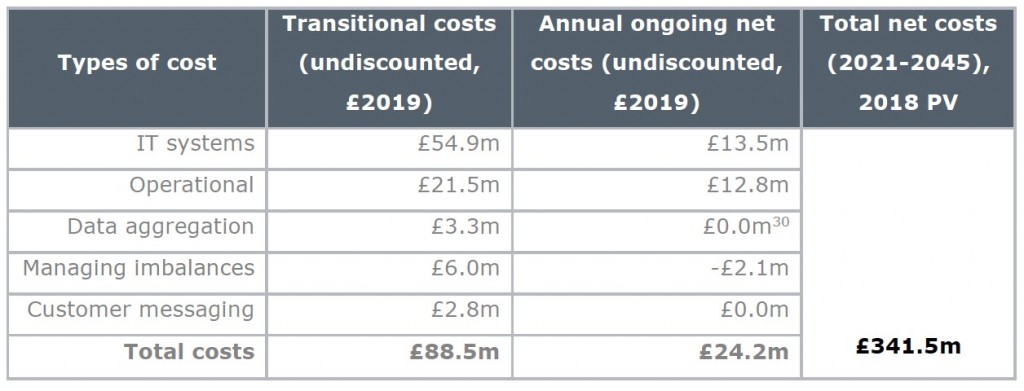Ofgem has fired the starting gun for a major change in the way consumers interact with their power supplier, announcing that all customers’ usage will be tracked on a half-hourly basis. It means that consumers will have the option of managing the way they use energy so that they avoid peak hours for price or carbon emissions, potentially reducing their bills and helping manage the grid.
 The so-called ‘half hourly settlement’ (HHS) approach will be mandated from October 2025.
The so-called ‘half hourly settlement’ (HHS) approach will be mandated from October 2025.
The switch will require changes in industry processes and supplier IT systems that Ofgem estimates will total over half a billion pounds (see table above) – a cost that will fall on consumers. But the regulator said the benefits – which include reducing the need for expensive and polluting peaking plants, helping consumers reduce their bills and having more options to manage a renewables-based system – would be at least £1.5B and could be as high as £4.5B.
Previously most customers have not been able to gain direct benefit from responding to the market, because instead of bring billing on real usage in each period their usage is ‘assumed’ based on one of a handful of average customer profiles. Half hourly metering has been available on an ‘elective’ basis, but Ofgem said that was unlikely to have enough takeup or result in new products. There were process and efficiency reasons for making HHS mandatory. It avoids having to run half-hourly and non-half-hourly systems at the same time, and having customers change between them. Direct benefits, such as shorter settlement timeframes, would need a large number of HH-settled customers.
Some companies expressed concern about the speed of the change, because it follows close on other major process changes like faster switching. But Ofgem added just six months to its initial 4-year rollout period. It noted, “Past experience of major reform programmes suggests that strong incentives will need to be placed on industry to ensure that it can be delivered efficiently.”
Ofgem said HHS would allow innovation in energy services and products which should improve outcomes for consumers, such as new tariff propositions, third party managed energy services with smart controls, bundled ‘asset and tariff’ offerings managed by the consumer or on their behalf; and new ways to provide flexibility to the energy system such as peer-to-peer trading and grid balancing services.
Making non-aggregated data available to central settlement systems will make aggregation for settlement more flexible and future proof.
Further reading
How can we ensure domestic electricity pricing is smart and fair in future?
The CMA, P272, and why consumers can’t take the full benefit of smart meters